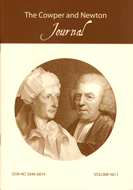Cowper is one of the great hymn writers. There can be few people,
however, who know that there is a hymn tune named after him.
Composed by J.G. Whittaker, it appears in Companion Tunes to Gadsby’s
Hymnbook (1927), a substantial compilation of old favourites and newer
pieces intended, as the title suggests, to meet the musical needs of those
Churches using William Gadsby’s Selection of Hymns for Public Worship.
The project was evidently a timely one, for the First Edition, issued in
February, was more or less immediately sold out and was followed by a
Second Edition (with minor corrections) in November.
Our initial researches have yielded no information about J.G.
Whittaker beyond an acknowledgement in the Companion which seems
to indicate that he was then still living. William Gadsby (1773-1844) is
an interesting figure well known in the history of Nonconformist religion.
The son of a road mender, he worked in his early years as a ribbon and
stocking weaver in the Midlands, but, already noted for his preaching,
was summoned in 1805 to become pastor at Back Lane Chapel, off
Rochdale Road, in Manchester, where he remained for the rest of his
life. Among his many writings was a body of hymns which he published
in 1814 in his Selection of Hymns. The volume was enlarged on several
occasions throughout the nineteenth century to include hymns by others
and additional ones by Gadsby himself, and has been continuously in
print to the present day. In 1835 Gadsby and his son founded the Gospel
Standard Magazine, to which a large portion of the Strict and Particular
Baptist churches, high Calvinist in persuasion, became affiliated. The
Gospel Standard denomination, which numbered around 150 churches in
1993, still uses Gadsby’s Selection almost exclusively as its hymnbook.
As exponents of Calvinist doctrine, Cowper and Newton are strongly
represented in its pages.
The tune ‘Cowper’ observes the form of ‘Long Metre’: that is eight
syllables in each line, as opposed to the alternating ‘eights and sixes’ of
‘Common Metre’ and the basic (though somewhat varied) six-syllable
pattern of ‘Short Metre’. The hymns specifically indicated alongside the
tune in the index of the Companion are ‘How pleasant, how divinely
fair’ by Isaac Watts, the non-attributed ‘Dear Lord! My panting soul
inflame’, and Newton’s ‘May this be a much-favoured hour’. The hymns
by Cowper for which it is suitable include ‘Jesus, where’er thy people
meet’ and ‘Thy mansion is the Christian’s heart’.

